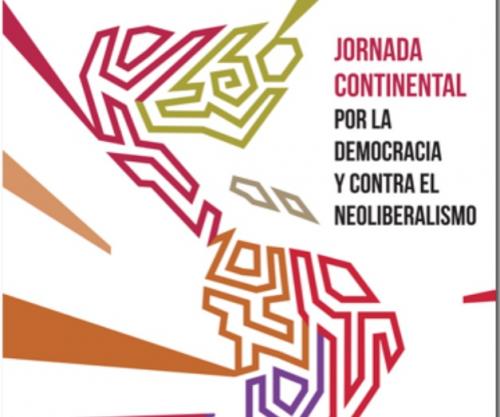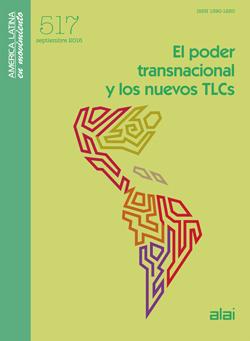A continental mobilization to resume the popular offensive
In spite of the offensive of the economic and political right in our countries, this is not a time to withdraw, nor to recede, nor to adopt tactics of "negotiating to lose less".
- Opinión

| Article published in ALAI’s magazine No. 517: El poder transnacional y los nuevos TLCs 22/09/2016 |
The social movements of our hemisphere are facing a crucial moment. The conservative and reactionary forces of the continent have launched an offensive from the right in all of America, including electoral formulas as in Argentina, a coup d'état in Honduras, Paraguay and Brazil, and destabilization and institutional breakdown in other countries. In this new scenario they are seeking to impose on trade unions and social movements the logic of "negotiating to lose less". For the popular camp, this would be a completely wrong course. Resistance should involve relaunching the progressive cycle, beyond its present limits. We have much to defend and much more to conquer.
In November 2005, in Mar del Plata, Argentina, a long period of struggle against the project of the FTAA (Free Trade Area of the Americas) promoted by the United States government, came to culmination. The 34 countries involved in the FTAA were negotiating a set of clauses that would lead to more precarious working conditions, the privatization of services, blocking of development policies in the countries of Latin America and their deeper dependency on Washington. With the FTAA, the US government wanted to extend NAFTA (the free trade agreement that includes Mexico, Canada and the US) to the whole continent. With this precedent, we had a clear experience underway that showed that free trade was negative for the workers of the three counties involved.
The trade unions of the continent therefore mobilized from an early stage to question what was under negotiation. We carried out the first demonstration when a round of negotiations took place in Belo Horizonte, Brazil, in 1997. In 2005, this struggle reached its highest point and we won. To achieve this, it was fundamental that in many countries progressive positions were advancing in civil society and in governments. The defeat of FTAA reflected the social and political ascent of progressive positions.
We stopped the FTAA, and this opened the way for initiatives of regional integration such as UNASUR, CELAC and ALBA, and a renewal of Mercosur. Finally, the pressure from our peoples led the US government to recognize the failure of their policy of the blockade against Cuba and to begin a process to reestablish relations. It was also regional pressure, in 2009, that rejected the intention of the Colombian government, under the presidency of Alvaro Uribe, to increase US military presence in that country, and it was regional action that created the conditions for a new negotiation between the government and the FARC (resistance army), which after four years of attempts came to an agreement.
In various countries we saw progress in collective negotiation and strengthened union organization. In some countries there were substantial improvements in the minimum wage and in the work market, recovering social security. In several cases, there were agrarian and agricultural policies that strengthened the small farmers. A new trend of social policies raised important sectors of population out of hunger and poverty. In several countries, there were advancements in the rights of women, of people of African descent and of native peoples, of youth and the LGBT population.
This is not a time for pulling back
From this perspective, we had the impression of being in a phase that was very different from that of the 1990s: in geopolitical terms or those of regional policy, in the area of social cohesion, or social and civil rights. And in fact that was the case, but not completely. Let us explain why.
In the first place, even though there was progress in many countries, in others the situation was dominated by the old agenda of neoliberalism and free trade. In Mar del Plata, the FTAA was defeated, but in the following years, this strategy continued to advance in countries where it was echoed in bilateral free trade agreements (Chile, Colombia, Peru) or sub-regional agreements (Central America and the Dominican Republic).
But there was a second aspect that questioned our action. In the new scenario, in which various countries attempted to overcome neoliberalism, the governmental forces moved to guarantee institutional governability by lessening the role of (organized) social sectors, and in particular the union movement. That is to say, there were social advances in some areas and stagnation, even regression, in others.
This strategy of governability meant that an important set of social claims that were very important to the popular sectors, were left aside. There were few countries in which the recognition and promotion of trade union freedom advanced. In general the governments looked for the economic sustainability of their post-neoliberal models, through a deepening of strategies that confronted the social claim of native peoples or came into contradiction with sensitive environmental matters.
And while the social indicators improved in some countries, there were no great structural transformations that guaranteed the permanence of these conquests. So, when the conservative and reactionary forces seized the initiative, they were faced with experiences fraught with serious contradictions, with many flanks open to attack, and which, in many cases, the people had difficulties in defending as their own.
Nonetheless, the process of struggle against neoliberalism and for democracy, that hit a high point in the defeat of the FTAA in 2005 and had positive effects in various countries, is not yet closed.
We say this because, on the one hand, these political forces of the right lack an economic and social programme that they can use to oppose the peoples’ agenda, as they had in the 1980s and 1990s with the rise of neoliberalism. Now they look to take advantage of the contradictions and weaknesses of the popular camp.
Meanwhile, on the other hand, the social and union forces today are much better organized, interconnected and mobilized than in the 1990s. Moreover, large contingents of the population have seen real advances in their conditions of life and work. They know that it is possible to improve social levels, that this is not a utopia. They have triumphs to defend and these have generated new expectations of improvement.
Therefore, in spite of the offensive of the economic and political right in our countries, this is not a time to withdraw, nor to recede, nor to adopt tactics of "negotiating to lose less", such as we have seen in other latitudes with the international unions. We are in a situation that demonstrates there are conditions for having important social and political conquests for the people.
The great challenge that we identified in the Hemispheric Encounter in Havana, Cuba at the end of 2015, ten years after the defeat of the FTAA, was to create the organizational and programmatic conditions for broad popular continental unity, in defense of democracy and against neoliberalism – in its most aggressive aspects –, the new free trade agreements and the actions of multinational corporations.
We achieved this at the beginning of this century and we can achieve it again, as long as we can overcome the previous limits and deformations that affected the progressive advances in the region.
We are therefore working with all our strength and energy, alongside other social movements and organizations, for the Continental Day for Democracy and against Neoliberalism.
On November 4th, 2016, we will cry out with one voice: Not one step backwards! Our people continue fighting for our integration, self-determination and sovereignty, against free trade and the transnationals!
(Translated for ALAI by Jordan Bishop).
- Rafael Freire Neto is secretary of Political Economy and Sustainable Development of the Trade Union Confederation of the Americas (TUCA-CSA).
Article published in la edition 517 (September 2016) of ALAI’s magazine América Latina en Movimiento, titled “El poder transnacional y los nuevos TLCs” (Transnational power and the new FTAs). http://www.alainet.org/es/revistas/517
Del mismo autor
Libre Comercio
- José Ramón Cabañas Rodríguez 01/04/2022
- Jorge Murga Armas 31/03/2022
- Jorge Murga Armas 30/03/2022
- Lori Wallach 22/03/2022
- Néstor Araujo 22/03/2022









